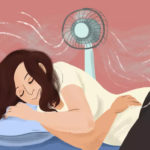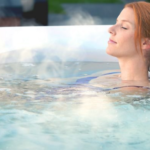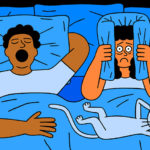A deep and peaceful sleep helps humans rejuvenate and restore energy after a hard day’s work. According to ancient wisdom, sleeping with your feet pointing west and your head not facing east is a prerequisite for a better sleep. This teaching is not just a superstitious saying; it is completely based on science.
Sleeping with your feet pointing west and your head not facing east
Quality and sufficient sleep is crucial for human health. If the quality of sleep is not ensured, it can harm our health, cause various diseases, and affect our bodies. In addition, staying up late and chronic lack of sleep can also affect our energy levels, work and study efficiency, weaken our immune system, and disrupt our endocrine system. Therefore, in life, in addition to nourishing the body and exercising regularly, we must also pay attention to ensuring the quality and duration of sleep.

In reality, quality sleep not only depends on daily rest and nutrition but also on sleep position and orientation. Ancient people used to say: “If you want to sleep easily, don’t point your feet west and your head should not face east.” They believed that sleeping north-south would promote better sleep and good health. Later, experts discovered the scientific basis behind this belief.
In construction, people often choose a north or south facing house. Particularly, south-facing houses have the characteristics of absorbing sunlight, generating positive energy, and benefiting the occupants. Therefore, the north-south orientation is believed to be beneficial for human bodies and helps to maintain vitality. Additionally, the human body also has a magnetic field. Most people know that the Earth is always surrounded by magnetic fields from the North and South Poles. Therefore, when sleeping with the head facing east and the feet facing west, it goes against the natural magnetic field’s law, which can affect blood circulation in the body.
In the short term, the body may not feel any changes. However, in the long run, sleeping in the wrong direction can deplete the body’s energy and affect our health. Once the functions are disturbed, various problems can occur such as dull skin, dizziness, blurred vision, and insomnia.
On the contrary, if we sleep with our head pointing north and our feet pointing south, we can maintain the balance of yin and yang in our bodies, bringing benefits to our physical and mental health.
Things to note for a good sleep
+ Establish a biological clock
Going to bed and waking up at the same time every day, including weekends, will create a good biological rhythm for your body. This habit will put your brain and body into a healthy sleep-wake cycle. As a result, you will fall asleep quickly and have a good night’s sleep.
+ Exercise regularly
Regular exercise has been proven to improve sleep quality. Even gentle yoga poses before bedtime can contribute to a perfect night’s sleep. Taking a walk at least 30 minutes before bedtime also helps improve sleep quality.
+ Choose the right sleeping position
Sleeping on your back is the best way to reduce insomnia because your head, neck, and spine can rest in a neutral position. Although not many people sleep in this position, doctors recommend it as the best position for a good night’s sleep.
Sleeping in a fetal position can restrict breathing and cause joint or back pain in the morning. According to statistics, the fetal position, with the knees curled up, is quite common, with 41% of adults sleeping in this position.

+ Create a suitable sleeping environment
An old, worn-out mattress of poor quality can be the cause of insomnia and poor sleep. Experts advise that if you have used a mattress for more than 7 years, you should check whether it still provides good support for sleeping positions.
In addition, use cotton bed sheets to avoid itchiness. Another tip is to use a satin pillow instead of cotton because it provides a comfortable, cool feeling when resting your head to sleep.
The ideal room temperature for sleeping is between 26-28 degrees Celsius. The bedroom should have good air circulation.
+ Avoid using electronic devices
To improve your sleep, avoid using electronic devices before going to bed. You should stay away from these devices before bedtime because the light they emit can significantly reduce sleep quality and cause insomnia. Also, consider that the bed is only for sleeping. If you bring work, leisure activities, or emotional discussions to bed, your body will not automatically enter a state of relaxation for sleep but will remain alert to think, ponder about daily matters.
Make sure to disconnect from the internet if you have had trouble sleeping for many nights as it will only worsen your insomnia.
Tips for Keeping Cool on a Hot Summer Day
As extreme weather patterns become increasingly common, many are struggling to find ways to cope. With temperatures in our country rising and cooling far beyond what used to be considered normal for the season, winter often feels like spring and summer can be oppressive and sweltering. How can we prepare for and manage the drastic shifts in climate?





































